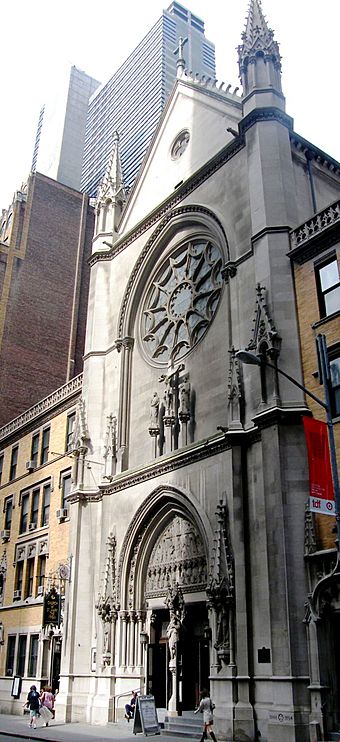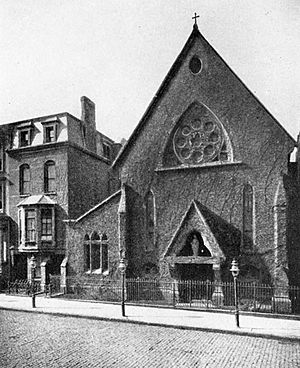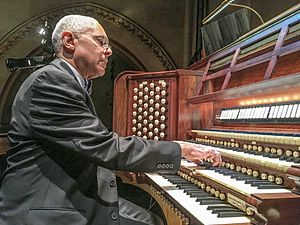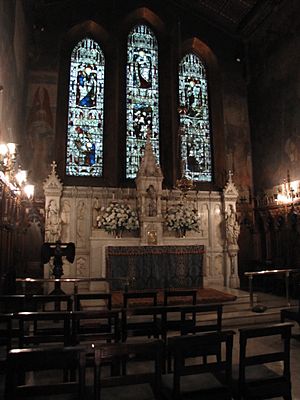Church of St. Mary the Virgin (Manhattan) facts for kids
|
Church of St. Mary the Virgin Complex
|
|

The church in 2008
|
|
| Location | 133-145 W. 46th St. & 136-144 W. 47th St. Manhattan, New York City |
|---|---|
| Built | 1894-95 |
| Architect | Napoleon LeBrun & Sons, Pierre Le Brun, architect-in-charge |
| Architectural style | French Gothic |
| NRHP reference No. | 90000606 |
Quick facts for kids Significant dates |
|
| Added to NRHP | April 16, 1990 |
The Church of Saint Mary the Virgin is a special type of Episcopal church called Anglo-Catholic. It is located right in the middle of Times Square in Midtown Manhattan, New York City. Because the church uses a lot of incense (a substance that makes sweet-smelling smoke) during its services, people often call it "Smoky Mary's."
The church was finished in 1895 and is famous for its beautiful design. It is built in a style called French Gothic, which was popular in the late 1800s. Because of its beauty and importance, it was named a New York City landmark in 1989. It was also added to the National Register of Historic Places in 1990. The church is an active community with hundreds of members.
Contents
History
The First Church

The story of Saint Mary's began in 1868. A priest named Thomas McKee Brown wanted to build a church in New York City. He wanted it to follow Anglo-Catholic traditions, which are part of the Episcopal Church but have ceremonies similar to the Catholic Church.
The Bishop of New York suggested building a church near what was then called Longacre Square. We know this area today as Times Square. A wealthy man named John Jacob Astor donated land for the church on West 45th Street.
The first church building was designed by William T. Hallett. It officially opened on December 8, 1870.
A New, Bigger Church
By 1890, so many people were coming to Saint Mary's that the first building was too small. Luckily, a member of the church named Sara L. Cooke left a large amount of money to the church when she passed away. This gift was used to build a new, much larger church.
The new church was built on a large piece of land between 46th and 47th Streets. The plan was to build a church, a house for the main priest (the rectory), and homes for other church leaders and staff.
The architectural firm Napoleon LeBrun & Sons was hired for the job. Building such a large church in a crowded city was a big challenge. They used a new method for the time: a hidden steel frame to support the building's stone walls. This made Saint Mary's one of the first churches in the world built with a steel skeleton.
The new church's cornerstone was laid in 1894, and it opened in 1895. The main part of the church, called the nave, is very tall, reaching 80 feet from the floor to the ceiling. Many of the beautiful sculptures on the church were created by an artist named J. Massey Rhind.
The Church Today
Today, Saint Mary's is known for its beautiful music and traditional services. On Sundays, the church holds special services called Solemn High Mass and Solemn Evensong. Mass is also held every day of the week.
The inside of the church was restored in the late 1990s. This restoration brought back bright colors, including a dark blue ceiling painted with gold stars. It remains a busy and important church in the heart of New York City.
-
A church procession walking through Times Square
-
Bishop Frank T. Griswold giving a sermon at Saint Mary's
Music at Saint Mary's

Music is a very important part of life at Saint Mary's. The church has a professional choir that sings at the main services. They sing many kinds of music, from very old chants written in Latin to modern pieces by living composers.
The church has had many talented organists and music directors over the years. The current organist and music director is David Hurd, a well-known musician and composer.
See also
 In Spanish: Iglesia de Santa María la Virgen (Nueva York) para niños
In Spanish: Iglesia de Santa María la Virgen (Nueva York) para niños
- List of New York City Designated Landmarks in Manhattan from 14th to 59th Streets
- National Register of Historic Places listings in Manhattan from 14th to 59th Streets
- High church
- Oxford Movement
- Donald L. Garfield
- Grieg Taber
- Granville M. Williams SSJE rector 1930-1939
 | Leon Lynch |
 | Milton P. Webster |
 | Ferdinand Smith |










